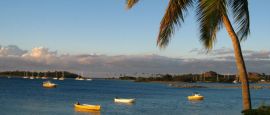Fiji: Doing business & staying in touch
Doing business in Fiji
Business dress is informal with normal attire for men comprising of trousers with an open-neck, short-sleeve shirt; suits and jackets are seldom required. Most business people prefer to be called by their first name, however, certain indigenous Fijians have the title 'Ratu' (for men) or 'Adi' (for women), meaning that they are of chiefly status.
Fiji Indians can be quite direct and want to know the ‘deal’ fairly quickly. They are traders by instinct and often base their evaluation on price. Part of the culture is Fiji time. Punctuality is not strictly observed. Meetings and appointments may not start on time - delays of 10-15 minutes are quite normal.
The Fijian economy has a sizeable subsistence agricultural sector as well as producing cash crops, of which sugar is the most important.
Fish (non-fillet frozen fish and processed fish) and gold are also vital export earners. Low-grade copper deposits exist on Viti Levu but have been judged uneconomic by transnational mining companies. Mineral water, in the form of ‘Fiji Water’ is the number one imported bottled water in the US and enjoyed in over 60 destinations. It’s also one of the leading exports of Fiji.
Tourism is the main service industry and the largest source of foreign exchange.
Annual GDP growth was estimated at + 4.20% in 2018. Fiji has established closer economic relations with Asian countries, including China, Korea (Republic of) and Taiwan.
Keeping in Touch in Fiji
Calls from hotels via an operator are very expensive. It is cheaper to get a public phonecard, available from airports, post offices and newsagents or from the Fiji International Telecommunications (FINTEL) office.
Roaming agreements exist with many international mobile phone companies. There is no coverage on outlying islands, only on Viti Levu.
Internet cafés are available in Suva, Nadi, Lautoka and most resorts and are relatively inexpensive. Internet connectivity in Fiji is good in some places such as Suva and Nadi, however, remote places can have a patchy internet service or no connection at all.
Airmail to Europe and North America can take up to 10 days. The main post office is on Victoria Parade, Suva.
Fiji's private press includes English-language dailies and Fijian- and Hindi-language weeklies. It has maintained its reputation for independent reporting despite interim military rule. The government has a stake in several publications. Radio is a prime source of information, particularly for the outer islands.
• The main English-language dailies are the Fiji Times and the Fiji Sun.
• Sartaj Singh and Shanti Dut are weekly publications in Hindi.
• The Review is a fortnightly news and business magazine.
• Fiji 1 is a national free-to-air channel operated by Fiji TV.
• Sky Pacific is a pay-TV service operated by Fiji TV.
• The state-owned commercial Fiji Broadcasting Corporation operates Fijian-language Radio Fiji One, Hindi-language Radio Fiji Two, music-based Gold FM, Hindi entertainment station Mirchi FMand music-based Bula FM.
• Privately-owned Communications Fiji Ltd operates four stations heard around the country: FM96 and Legend FM in English, Viti FM in Fijian, and Radio Navtarang in Hindi.
• The BBC World Service and Radio Australia are available on FM relays.








 You know where
You know where